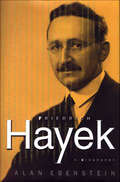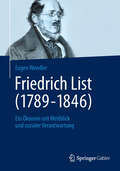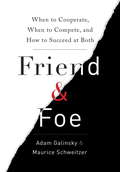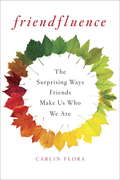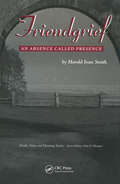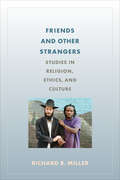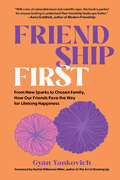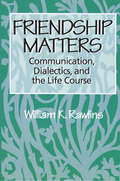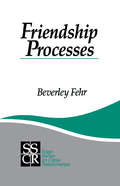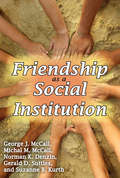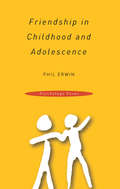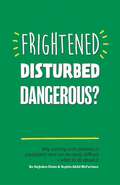- Table View
- List View
Frieden durch Selbstbestimmung: Erfolg und Scheitern territorialer Autonomie
by Felix SchulteSeit Ende des Kalten Krieges wurden in mehr als 200 Friedensverträgen Autonomieabkommen vereinbart. Während manche Autonomielösungen ethnische Selbstbestimmungskonflikte erfolgreich regulieren konnten, sind andere gescheitert. Wann also funktioniert Autonomie? Dieses Buch verbindet Ansätze aus der Politikwissenschaft, der Konfliktforschung und der Sozialpsychologie und entwickelt eine neue Theorie zur Erklärung von Autonomieerfolg und -scheitern. Diese beschreibt einen initiierten Prozess der ethnischen Anerkennung als Grundlage für ein friedliches Zusammenleben in multiethnischen Post-Konfliktgesellschaften. Während territoriale Autonomiearrangements hierfür einen geeigneten institutionellen Rahmen bieten, ist dieser Anerkennungsprozess stark kontextabhängig. Die Studie identifiziert hierfür kausal relevante Faktoren und analysiert deren Auftreten in den Konsolidierungsphasen von 19 Autonomien weltweit mittels Qualitative Comparative Analysis (QCA) und theorietestenden Prozessanalysen. Die Studie zeigt, dass Autonomieerfolg in der Tat von einer spezifischen Kombination von strukturellen und akteurszentrierten Erfolgsfaktoren abhängt. Ethnische Eliten akzeptieren Autonomiereformen, wenn diese ein hohes Maß an Selbstbestimmung mit sich bringen und gleichzeitig der Anerkennungsprozess nicht durch ausgeprägte Ungleichheiten behindert wird. Elitenkooperationen gelingen in demokratisch-inklusiven Institutionen und mit internationaler Unterstützung und senden entscheidende Signale für gesellschaftliche Annäherung. Autonomiereformen scheitern, wenn der Grad an gewährter Selbstbestimmung zu gering ist und horizontale Ungleichheiten zu neuen Grievances führen. In Kombination mit exklusiven Institutionen und mangelnder internationaler Aufmerksamkeit führt dies zu weiterer Eskalation.
Friedman's Fables
by Edwin H. FriedmanDr. Friedman has woven 24 illustrative tales that offer fresh perspectives on familiar human foibles and reflect the author's humor, pathos, and understanding. Friedman takes on resistance and other "demons" to show that neither insight, nor encouragement, nor intimidation can in themselves motivate an unmotivated person to change. These tales playfully demonstrate that new ideas, new questions, and imagination, more than accepted wisdom, provide each of us with the keys to overcoming stubborn emotional barriers and facilitating real change both in ourselves and others. Thought-provoking discussion questions for each fable are included.
Friedman's Fables (with Booklet)
by Edwin H. FriedmanDr. Friedman has woven 24 illustrative tales that offer fresh perspectives on familiar human foibles and reflect the author's humor, pathos, and understanding. Friedman takes on resistance and other "demons" to show that neither insight, nor encouragement, nor intimidation can in themselves motivate an unmotivated person to change. These provocative tales playfully demonstrate that new ideas, new questions, and imagination, more than accepted wisdom, provide each of us with the keys to overcoming stubborn emotional barriers and facilitating real change both in ourselves and others. Sure to intrigue and inform, this book belongs in the resource library of public speakers, teachers, trainers, and clergy, as well as general readers.
Friedrich Hayek: A Biography
by Alan EbensteinThis biography tells the story of one of the most important public figures of the twentieth century, Friedrich Hayek.Here is the first full biography of Friedrich Hayek, the Austrian economist who became, over the course of a remarkable career, the great philosopher of liberty in our time. In this richly detailed portrait, Alan Ebenstein chronicles the life, works, and legacy of a visionary thinker, from Hayek's early years as the scholarly son of a physician in fin-de-siecle Vienna on an increasingly wider world as an economist and political philosopher in London, New York, and Chicago.Ebenstein gives a balanced, integrated account of Hayek's extraordinary diverse body of work, from his fist encounter with the free market ideas of mentor Ludwig Von Mises to his magisterial writings in later life on the legal, political, ethical, and economic requirements of a free society. Awarded the Nobel Prize in 1974, Hayek's vision of a renewed classical liberalism-of free markets and free ideas in free societies-has taken hold in much of the world.Alan Ebenstein's clearly written account is an essential starting point for anyone seeking to understand why Hayek's ideas have become the guiding force of our time. His illuminating portrait of Hayek the man brings to new life the spirit of a great scholar and tenacious advocate who has become, in Peter Drucker's words, "our time's preeminent social philosopher."
Friedrich List (1789-1846)
by Eugen WendlerFriedrich List (1789-1846) was a prophet of social market economy, national economy and the infant-industry theory. In this comprehensive biography the international influence and reception of List's theories is presented together with his extraordinary vita List was a notable early advocate of economic integration of the many separate states of 19th century Germany. His basic theory is that of productive resources and the need to protect infant industries until they have matured enough to stand alone. He is recognized as a visionary economist with social responsibility and as an influential railway pioneer. He was a liberal and a democrat who promoted an extended representative democracy, including respect for human rights and civil liberties, to accompany industrial development His highly influential main work "The National System of Political Economy" has been translated into many languages. Eugen Wendler, the renowned author and List expert, not only builds upon his many years of research, but also discusses several new sources. This richly illustrated book is as informative as it is well written.
Friedrich List (1789-1846)
by Eugen WendlerIn dieser ebenso unterhaltsamen wie informativen Biografie wird die Wirkungs- und Rezeptionsgeschichte der Theorien von Friedrich List auf der Basis seines außergewöhnlichen Lebenslaufes dargestellt. Der renommierte und mehrfach für seine Forschung ausgezeichnete List-Experte Eugen Wendler fasst hier die Ergebnisse seiner langjährigen Forschungsarbeit zusammen und ergänzt sie durch neueste Erkenntnisse und Quellen. So ist ein umfassendes und werthaltiges Werk entstanden, das zudem zahlreiche bislang noch unbekannte Abbildungen enthält.
Friend & Foe: When to Cooperate, When to Compete, and How to Succeed at Both
by Adam Galinsky Maurice SchweitzerWhat does it take to succeed? This question has fueled a long-running debate. Some have argued that humans are fundamentally competitive, and that pursuing self-interest is the best way to get ahead. Others claim that humans are born to cooperate and that we are most successful when we collaborate with others. In FRIEND AND FOE, researchers Galinsky and Schweitzer explain why this debate misses the mark. Rather than being hardwired to compete or cooperate, we have evolved to do both. In every relationship, from co-workers to friends to spouses to siblings we are both friends and foes. It is only by learning how to strike the right balance between these two forces that we can improve our long-term relationships and get more of what we want.Here, Galinsky and Schweitzer draw on original, cutting edge research from their own labs and from across the social sciences as well as vivid real-world examples to show how to maximize success in work and in life by deftly navigating the tension between cooperation and competition. They offer insights and advice ranging from: how to gain power and keep it, how to build trust and repair trust once it's broken, how to diffuse workplace conflict and bias, how to find the right comparisons to motivate us and make us happier, and how to succeed in negotiations - ensuring that we achieve our own goals and satisfy those of our counterparts.Along the way, they pose and offer surprising answers to a number of perplexing puzzles: when does too much talent undermine success; why can acting less competently gain you status and authority, where do many gender differences in the workplace really come from, how can you use deception to build trust, and why do you want to go last on American Idol and in many interview situations, but make the first offer when negotiating the sale of a new car.We perform at our very best when we hold cooperation and competition in the right balance. This book is a guide for navigating our social and professional worlds by learning when to cooperate as a friend and when to compete as a foe--and how to be better at both.
Friendfluence: The Surprising Ways Friends Make Us Who We Are
by Carlin FloraDiscover the unexpected ways friends influence our personalities, choices, emotions, and even physical health in this fun and compelling examination of friendship, based on the latest scientific research and ever-relatable anecdotes.Why is dinner with friends often more laughter filled and less fraught than a meal with family? Although some say it's because we choose our friends, it's also because we expect less of them than we do of relatives. While we're busy scrutinizing our romantic relationships and family dramas, our friends are quietly but strongly influencing everything from the articles we read to our weight fluctuations, from our sex lives to our overall happiness levels.Evolutionary psychologists have long theorized that friendship has roots in our early dependence on others for survival. These days, we still cherish friends but tend to undervalue their role in our lives. However, the skills one needs to make good friends are among the very skills that lead to success in life, and scientific research has recently exploded with insights about the meaningful and enduring ways friendships influence us. With people marrying later--and often not at all--and more families having just one child, these relationships may be gaining in importance. The evidence even suggests that at times friends have a greater hand in our development and well-being than do our romantic partners and relatives.Friends see each other through the process of growing up, shape each other's interests and outlooks, and, painful though it may be, expose each other's rough edges. Childhood and adolescence, in particular, are marked by the need to create distance between oneself and one's parents while forging a unique identity within a group of peers, but friends continue to influence us, in ways big and small, straight through old age.Perpetually busy parents who turn to friends--for intellectual stimulation, emotional support, and a good dose of merriment--find a perfect outlet to relieve the pressures of raising children. In the office setting, talking to a friend for just a few minutes can temporarily boost one's memory. While we romanticize the idea of the lone genius, friendship often spurs creativity in the arts and sciences. And in recent studies, having close friends was found to reduce a person's risk of death from breast cancer and coronary disease, while having a spouse was not.Friendfluence surveys online-only pals, friend breakups, the power of social networks, envy, peer pressure, the dark side of amicable ties, and many other varieties of friendship. Told with warmth, scientific rigor, and a dash of humor, Friendfluence not only illuminates and interprets the science but draws on clinical psychology and philosophy to help readers evaluate and navigate their own important friendships.
Friendgrief: An Absence Called Presence (Death, Value and Meaning Series)
by Harold Ivan SmithThis book not only examines friendgrief from a theoretical and clinical framework, but also Smith offers fascinating vignettes from the lives of well-known friendgrievers such as Elton John, Diane Sawyer, Ralph Abernathy, C. S. Lewis, Harry Truman, Tommy Lasorda, Jimmy Carter, Fritz Mondale, Bill Clinton, Calvin Trillin, and Alan King. The author includes moving narratives of numerous individuals who have never gained notoriety but have become seasoned friendgrievers.
Friends and Other Strangers: Studies in Religion, Ethics, and Culture
by Richard MillerFriends and Other Strangers argues for expanding the field of religious ethics to address the normative dimensions of culture, interpersonal desires, friendships and family, and institutional and political relationships. Richard B. Miller urges religious ethicists to turn to cultural studies to broaden the range of the issues they address and to examine matters of cultural practice and cultural difference in critical and self-reflexive ways. Friends and Other Strangers critically discusses the ethics of ethnography; ethnocentrism, relativism, and moral criticism; empathy and the ethics of self-other attunement; indignation, empathy, and solidarity; the meaning of moral responsibility in relation to children and friends; civic virtue, war, and alterity; the normative and psychological dimensions of memory; and religion and democratic public life. Miller challenges distinctions between psyche and culture, self and other, and uses the concepts of intimacy and alterity as dialectical touchstones for examining the normative dimensions of self-other relationships. A wholly contemporary, global, and interdisciplinary work, Friends and Other Strangers illuminates aspects of moral life ethicists have otherwise overlooked.
Friends: Understanding the Power of our Most Important Relationships
by Robin Dunbar'Fascinating...In essence, the number and quality of our friendships may have a bigger influence on our happiness, health and mortality risk than anything else in life save for giving up smoking' Guardian, Book of the DayFriends matter to us, and they matter more than we think. The single most surprising fact to emerge out of the medical literature over the last decade or so has been that the number and quality of the friendships we have has a bigger influence on our happiness, health and even mortality risk than anything else except giving up smoking.Robin Dunbar is the world-renowned psychologist and author who famously discovered Dunbar's number: how our capacity for friendship is limited to around 150 people. In Friends, he looks at friendship in the round, at the way different types of friendship and family relationships intersect, or at the complex of psychological and behavioural mechanisms that underpin friendships and make them possible - and just how complicated the business of making and keeping friends actually is.Mixing insights from scientific research with first person experiences and culture, Friends explores and integrates knowledge from disciplines ranging from psychology and anthropology to neuroscience and genetics in a single magical weave that allows us to peer into the incredible complexity of the social world in which we are all so deeply embedded.Working at the coalface of the subject at both research and personal levels, Robin Dunbar has written the definitive book on how and why we are friends.
Friends: Understanding the Power of our Most Important Relationships
by Robin DunbarFriends matter to us, and they matter more than we think. The single most surprising fact to emerge out of the medical literature over the last decade or so has been that the number and quality of the friendships we have has a bigger influence on our happiness, health and even mortality risk than anything else except giving up smoking.Robin Dunbar is the world-renowned psychologist and author who famously discovered Dunbar's number: how our capacity for friendship is limited to around 150 people. In Friends, he looks at friendship in the round, at the way different types of friendship and family relationships intersect, or at the complex of psychological and behavioural mechanisms that underpin friendships and make them possible - and just how complicated the business of making and keeping friends actually is.Mixing insights from scientific research with first person experiences and culture, Friends explores and integrates knowledge from disciplines ranging from psychology and anthropology to neuroscience and genetics in a single magical weave that allows us to peer into the incredible complexity of the social world in which we are all so deeply embedded.Working at the coalface of the subject at both research and personal levels, Robin Dunbar has written the definitive book on how and why we are friends.
Friends: Understanding the Power of our Most Important Relationships
by Robin Dunbar'Fascinating...In essence, the number and quality of our friendships may have a bigger influence on our happiness, health and mortality risk than anything else in life save for giving up smoking' Guardian, Book of the DayFriends matter to us, and they matter more than we think. The single most surprising fact to emerge out of the medical literature over the last decade or so has been that the number and quality of the friendships we have has a bigger influence on our happiness, health and even mortality risk than anything else except giving up smoking.Robin Dunbar is the world-renowned psychologist and author who famously discovered Dunbar's number: how our capacity for friendship is limited to around 150 people. In Friends, he looks at friendship in the round, at the way different types of friendship and family relationships intersect, or at the complex of psychological and behavioural mechanisms that underpin friendships and make them possible - and just how complicated the business of making and keeping friends actually is.Mixing insights from scientific research with first person experiences and culture, Friends explores and integrates knowledge from disciplines ranging from psychology and anthropology to neuroscience and genetics in a single magical weave that allows us to peer into the incredible complexity of the social world in which we are all so deeply embedded.Working at the coalface of the subject at both research and personal levels, Robin Dunbar has written the definitive book on how and why we are friends.
Friendship
by A. C. GraylingA central bond, a cherished value, a unique relationship, a profound human need, a type of love. What is the nature of friendship, and what is its significance in our lives? How has friendship changed since the ancient Greeks began to analyze it, and how has modern technology altered its very definition? In this fascinating exploration of friendship through the ages, one of the most thought-provoking philosophers of our time tracks historical ideas of friendship, gathers a diversity of friendship stories from the annals of myth and literature, and provides unexpected insights into our friends, ourselves, and the role of friendships in an ethical life. A. C. Grayling roves the rich traditions of friendship in literature, culture, art, and philosophy, bringing into his discussion familiar pairs as well as unfamiliar--Achilles and Patroclus, David and Jonathan, Coleridge and Wordsworth, Huck Finn and Jim. Grayling lays out major philosophical interpretations of friendship, then offers his own take, drawing on personal experiences and an acute awareness of vast cultural shifts that have occurred. With penetrating insight he addresses internet-based friendship, contemporary mixed gender friendships, how friendships may supersede family relationships, ones duty within friendship, the idea of friendship to humanity, and many other topics of universal interest.
Friendship First: How To Make Your Friends Matter The Most
by Gyan YankovichOur friends enrich every part of our lives. Now you can make them matter the most. Despite modern technology and the ample ways we have to keep in touch, we risk neglecting our relationships with the people who have the most profound effect on our well-being: our friends. Weaving together personal stories, interviews with experts, and social research, Friendship First empowers you to nurture relationships with friends both new and old. Journalist Gyan Yankovich reveals how friendships play a vital role in our happiness with insights on how to: Deepen workplace friendships outside the office Invite friends into activities typically reserved for families Use social media to strengthen connections Maintain friendships through major life transitions. An ode to group chats and chosen family, Friendship First invites you to care for and count on those who matter most.
Friendship Matters: Communication, Dialectics, And The Life Course
by William RawlinsIn this volume, Dr. Rawlins traces and investigates the varieties, tensions, and functions of friendship for males and females throughout the life course. Using both conceptual and illustrative chapters, the book portrays the degrees of involvement, choice, risk, ambivalence, and ambiguity within friendships, and explores the emotional texture of interactions among friends. A concluding section examines the prospects for friendship in the course of our post-modern blurring of public and private domains and discursive sites.
Friendship Processes
by Beverley FehrThis broad-ranging volume examines how friends give meaning to our lives. Each phase of the friendship process is illustrated with empirical research. The result is a conceptual framework that illuminates the fascinating components involved in making friends, becoming close and keeping friends, and in friendships deteriorating and dissolving.
Friendship and Happiness
by Melikşah DemirThis is the first book that explicitly focuses on the relationships between various types of friendship experiences and happiness. It addresses historical, theoretical, and measurement issues in the study of friendship and happiness (e. g. , why friends are important for happiness). In order to achieve a balanced evaluation of this area as a whole, many chapters in the book conclude with a critical appraisal of what is known about the role of friendship in happiness, and provide important directions for future research. Experts from different parts of the world provide in-depth, authoritative reviews on the association between different types of friendship experiences (e. g. , friendship quantity, quality) and happiness in different age groups and cultures. An ideal resource for researchers and students of positive psychology, this rich, clear, and up-to-date book serves as an important reference for academicians in related fields of psychology such as cross-cultural, developmental and social.
Friendship and Other Weapons: Group Activities to Help Young Girls Aged 5-11 to Cope with Bullying
by Signe WhitsonLong before most school programs begin anti-bullying campaigns, young girls are getting a full education in social aggression. Girls as young as age five are experiencing acts of bullying, disguised as friendship, that shake the carefully laid foundations of their self-image, personal values, and beliefs about peer relationships. Based on thought-provoking discussions, engaging games, strength-discovering exercises, and confidence-boosting fun, the hands-on activities in Friendship and Other Weapons build critical knowledge and friendship survival skills such as: · Recognizing the Red Flags of Girl Bullying · Responding Assertively to Bullying Behavior · Realizing Personal Strengths · Becoming an Ally to Others Facing Bullying · Resolving Conflicts Directly · Using Technology and Social Media Ethically This photocopiable resource book provides educators, social workers and counsellors with a complete, ready-to-use group curriculum to help young girls aged 5-11 build constructive and fulfilling friendships.
Friendship as a Social Institution
by Michal McCallWhat is the social organization of love, friendship, rivalry, marriage, admiration, collegiality, parenthood, acquaintance, and clientage? How are these types of relationships similar and how do they differ? Few sociological works exist on relationships between friends, business partners, customers and clerks, mailmen and homeowners, and employers and employees, as social rather than role relationships. This classic book remains of interest because it focuses on voluntary personal relationships relationships that people need not enter, whose content is up to the participants, whose rules are what the participants agree they will be.The authors create an analytic framework within which to describe and compare the enormous range of relationships between two persons. They detail the shape and structure of such relationships, consider their organizational dynamics, their range and the nature of deviance in them, and point out analytical variables and dimensions upon which relationships can be located for comparative purposes. Organizational change in terms of how relationships are formed, developed, and transformed is covered, as is their function and dysfunction for the individual and society.By regarding social relationships consistently from the viewpoint of social organization theory, the book assimilates them to sociological concepts in general, but with an eye to the social psychological and organizational features that render them distinctive as a type. Friendship as a Social Institution sustains the study of friendship by making distinctions and outlining the problems connected with the study of social relationships.
Friendship in Childhood and Adolescence
by Phil ErwinFriendships are crucial to children's well-being and happiness and lay important foundations upon which later relationships in adolescence and adulthood are built. This clear, well-structured overview of the nature and significance of children's and adolescents' friendships examines issues such as the impact of social-cognitive development, relationship problems, and methods of promoting positive relationships.
Friendship: A Natural History
by Lydia DenworthA Next Big Idea Club Must-Read Nonfiction Book of Winter 2020 A revelatory investigation of friendship, with profound implications for our understanding of what humans and animals alike need to thrive across a lifetime. The phenomenon of friendship is universal and elemental. Friends, after all, are the family we choose. But what makes these bonds not just pleasant but essential, and how do they affect our bodies and our minds? In Friendship, science journalist Lydia Denworth takes us in search of friendship’s biological, psychological, and evolutionary foundations. She finds friendship to be as old as early life on the African savannas—when tribes of people grew large enough for individuals to seek fulfillment of their social needs outside their immediate families. Denworth sees this urge to connect reflected in primates, too, taking us to a monkey sanctuary in Puerto Rico and a baboon colony in Kenya to examine social bonds that offer insight into our own. She meets scientists at the frontiers of brain and genetics research and discovers that friendship is reflected in our brain waves, our genomes, and our cardiovascular and immune systems; its opposite, loneliness, can kill. At long last, social connection is recognized as critical to wellness and longevity. With insight and warmth, Denworth weaves past and present, field biology and neuroscience, to show how our bodies and minds are designed for friendship across life stages, the processes by which healthy social bonds are developed and maintained, and how friendship is changing in the age of social media. Blending compelling science, storytelling, and a grand evolutionary perspective, Denworth delineates the essential role that cooperation and companionship play in creating human (and nonhuman) societies. Friendship illuminates the vital aspects of friendship, both visible and invisible, and offers a refreshingly optimistic vision of human nature. It is a clarion call for putting positive relationships at the center of our lives.
Friendships in Childhood and Adolescence
by Michelle Schmidt Catherine BagwellHighly readable and comprehensive, this volume explores the significance of friendship for social, emotional, and cognitive development from early childhood through adolescence. The authors trace how friendships change as children age and what specific functions these relationships play in promoting adjustment and well-being. Compelling topics include the effects of individual differences on friendship quality, how friendship quality can be assessed, and ways in which certain friendships may promote negative outcomes. Examining what clinicians, educators, and parents can do to help children who struggle with making friends, the book reviews available interventions and identifies important directions for future work in the field.
Friendships: The Aspie Way
by Wendy LawsonPeople with Asperger's Syndrome have difficulty with interpersonal relationships, yet are well known to be loyal and dependable friends. Wendy Lawson felt she had a knack for upsetting people and was surprised to be told that she 'did friendship rather well'. In her frank and thoughtful analysis of what makes and breaks friendships, she explores what it means to have friends or be a friend - even a friend to oneself; what happens when times are tough and friends are scarce; whether one can be a 'good friend' without effort; and what other kinds of friendships there are, whether imaginary, animal or inanimate. These ideas are accompanied by practical examples, poetry and stories. Insightful and relevant to people both on and off the autism spectrum, Friendships: The Aspie Way is a fresh approach to a universal issue in human relationships.
Frightened, Disturbed, Dangerous?: Why working with patients in psychiatric care can be really difficult, and what to do about it
by Bo Hejlskov Elvén Sophie Abild McfarlanePatients in psychiatric care can behave in ways that can be alarming for staff, and difficult to respond to. The authors of this practical and imaginative book explain why patients may behave in these ways, and offer a toolkit of ways to respond effectively and kindly. With many everyday examples of how to keep the space positive and safe, and patients calm, this book could transform your working life.


